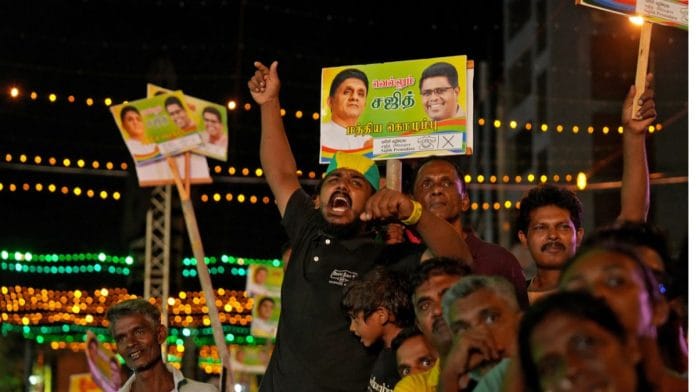Colombo: The Tamil vote could be the make-or-break in the highly decisive Sri Lankan presidential elections, which goes to polls today.
Accounting for about 15 percent of the population, Tamil are the largest minority group and have historically voted as one block. But this time, the Tamil vote is fractured.
And the three front-runners—current President Ranil Wickremesinghe, leader of the opposition and Samagi Jana Balawegaya (SJB) supremo Sajith Premadasa, and leader of the Marxist National People’s Power (NPP) Anura Kumara Dissanayake—need a significant chunk of the Tamil vote to be able to reach the majority mark.
Tamils have typically had an easier choice: they would vote for anybody who isn’t named Rajapaksa. The community still blames the Rajapaksa family for the fallout of the civil war, which lasted from 1983 to 2009. This is the fourth presidential election since the end of the LTTE.
This time, it’s clear that Dissanayake, who is largely seen as a Sinhala radical, will not be winning many votes from the Tamil population. But both Wickremesinghe and Premadasa need the Tamil vote to back them to be able to make the majority cut-off.
What has fractured this vote bank even further is a surprise “common Tamil candidate”—P. Ariyanethiran. He’s a symbolic contender, and isn’t expected to capture much of the public vote, but he represents a spanner in the works for Wickremesinghe and Premadasa.
“Historically, the presidential elections have always been an election where the Tamil constituencies aren’t clear on who to vote for,” said Dr Ahilan Kadirgamar, sociologist at the University of Jaffna. “Tamil politics has fragmented. So in that context, there isn’t a clear line on whom to vote for. And it’s in this context that this common candidate has emerged.”
The deep divide leaves many feeling as if this election is a Sinhala-only election. The Tamils’ choices range from backing the common Tamil candidate, a Sinhala leader, to boycotting the election.
“The common Tamil candidate will never become the President, so there’s no point,” said Maravanpulavu Sachchitananthan, a Tamil Hindu in Jaffna who is boycotting the election. “It feels like this election is for the Sinhalese people to decide their leader. Only a Sinhala Buddhist can become the President.”
Also read: Sri Lankan Oppn leader Premadasa calls Wickremesinghe govt corrupt, campaigns on correcting policies
The split in the vote bank
The two major Tamil parties representing the north and the east, the Tamil National Alliance (TNA) and the Ilankai Tamil Arasu Katchi (ITAK), are also split in their support.
Even though the Tamil common candidate Ariyanethiran is a member of the ITAK, the party has decided to endorse Premadasa instead, as has the TNA. And members of both parties are also split over whom to vote for.
The ITAK leadership even reportedly requested Ariyanethiran to withdraw from the presidential race to try to consolidate the vote bank. M.A. Sumanthiran, the TNA leader, called his candidacy a “nonsensical one”.
The common candidate is both a result and an answer to Tamil nationalist politics, according to Dr Kadirgamar.
“What is new this time is the common candidate as a way to rally forces, even though it’s a bit of a dead end,” he said. “Many Tamil nationalists think that if there’s enough votes for him, it’ll influence the international community since a lot of Tamil nationalist politics is geared towards that.”
If he does well, the hope is that it will help in the upcoming parliamentary elections, slated for 2025.
Premadasa has promised the full implementation of the 13th Amendment in Sri Lanka, which devolves power to the provincial councils of the country. The 13th amendment was passed after the Indo-Sri Lankan Accord in 1987, and still hasn’t been fully implemented. Many Sri Lankan leaders have been unwilling to devolve police and land powers to the provincial councils. It’s why both the TNA and ITAK leadership have thrown their weight behind Premadasa.
The Tamils in the north and east aren’t the only significant voting blocks. The Indian Origin Tamils, or Malaiyaha Tamils who live in upcountry Sri Lanka and work in tea estates, form about 4.5 percent of the population and vote completely differently from Sri Lankan Tamils. Wickremesinghe has addressed this group, most notably, introducing an Upcountry Charter, and gazetting it just a day before the country goes to polls.
The Tamil question, however, doesn’t seem to be central in this election. Instead, young Tamils—many of whom grew up as the war ended—are looking to future economic prospects.
“This time the Tamil choice will be between Sajith and Ranil,” said S. Rajasingham, a 27-year-old who works in Colombo. “For me, it’s more a question of the overall economy and not as much about my Tamil identity.”
Also read: Ranil, Oppn leader in Sri Lanka presidential race with ‘wild card’ Marxist & Rajapaksa scion






